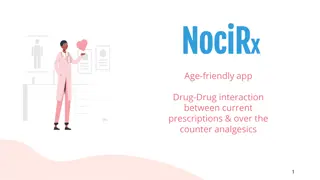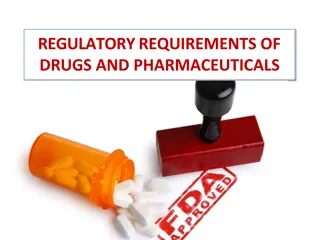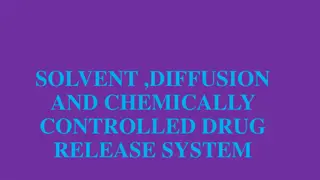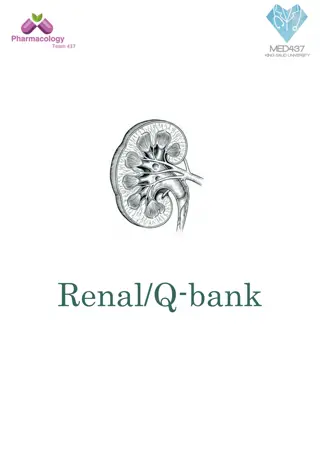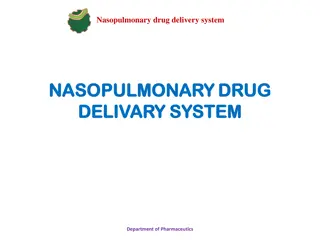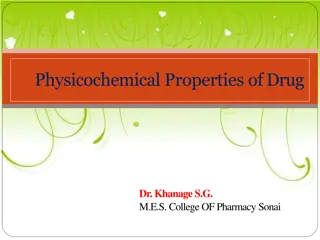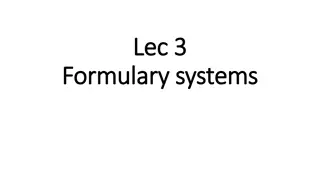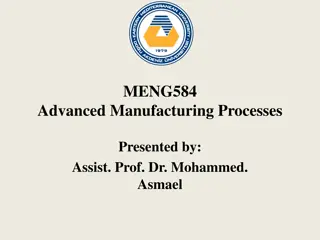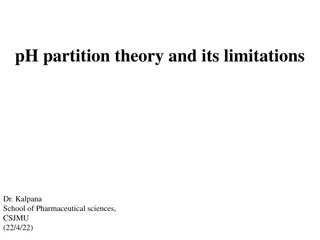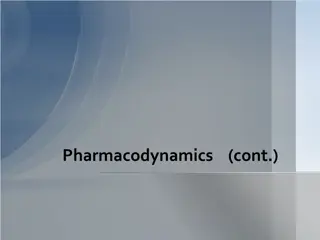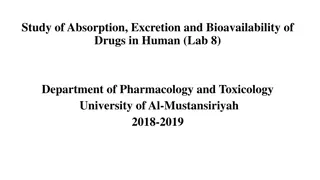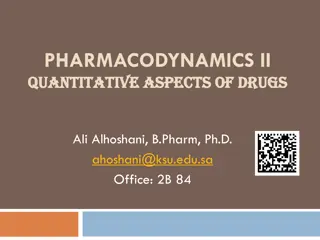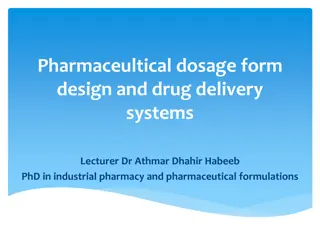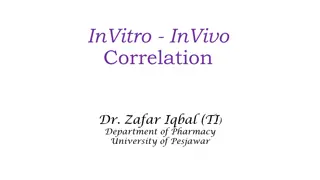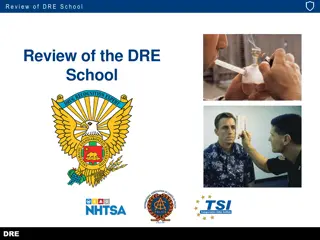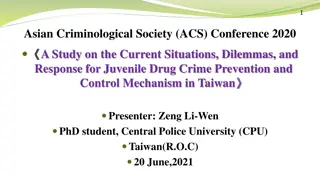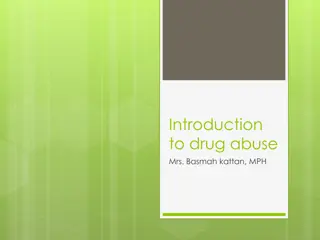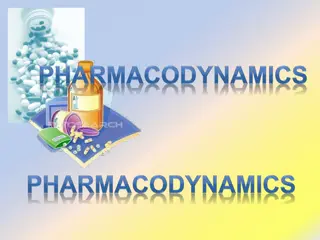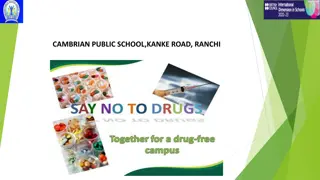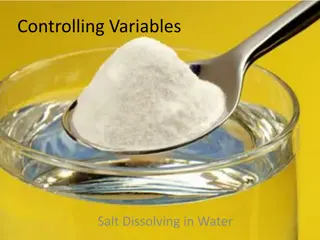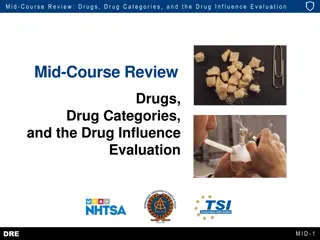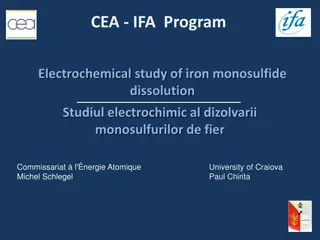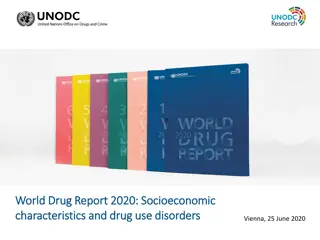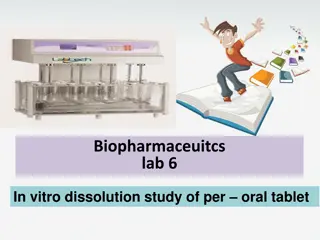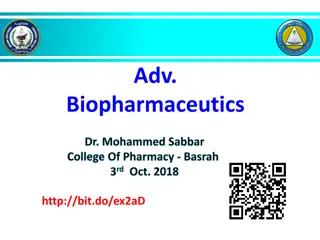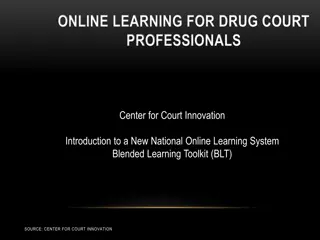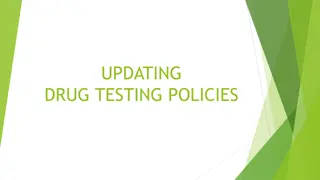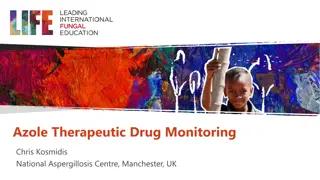Strategic Differentiation for a New Drug in a Crowded Market
We, at Jasper Colin, stepped in to help them create a strategic positioning for their new drug, ensuring it stood out in a competitive landscape. Our strategic positioning efforts gave the drug a competitive edge, making it a preferred choice among European physicians.\n\nRead the full report to div
4 views • 6 slides
Age-Friendly App: Managing Drug-Drug Interactions Between Prescriptions and OTC Analgesics
The Age-Friendly app addresses the crucial issue of drug-drug interactions between current prescriptions and over-the-counter analgesics in the geriatric population. With a significant percentage of OTC sales attributed to older adults, there is an increased risk of adverse drug events due to polyph
1 views • 25 slides
Understanding Piecemeal Distribution of Cash in Partnership Dissolution
Piecemeal distribution of cash in partnership dissolution involves systematically distributing cash over stages as assets are realized and liabilities settled. Realization expenses, contingent liabilities, outside liabilities, partners' loans, and partners' capitals are settled in a specific order.
0 views • 6 slides
Understanding Regulatory Requirements of Drugs and Pharmaceuticals
Drug regulation involves controlling drug use through international agreement authorities like the FDA, EMA, and PMDA. The FDA plays a crucial role in drug evaluation and research, biologic evaluation, devices, and food safety. There are various types of applications for drug approval, along with a
0 views • 28 slides
Polymeric Controlled Drug Delivery Systems
Polymeric controlled drug delivery systems play a crucial role in regulating drug release through diffusion, solvent penetration, and chemical mechanisms. These systems include diffusion-controlled, solvent-controlled, and chemically-controlled devices, each operating based on specific principles. S
0 views • 33 slides
Renal Pharmacology: Drug Excretion and Renal Clearance Questions
This comprehensive set of questions and answers covers topics related to drug excretion and renal pharmacology. It includes information on glomerular filtration, drug excretion mechanisms, dosage adjustments in renal impairment, factors influencing drug excretion, and the effects of long-term NSAID
0 views • 55 slides
Understanding Nasopulmonary Drug Delivery System
Nasopulmonary drug delivery system, utilizing the nasal route for drug administration, offers advantages such as hepatic first-pass metabolism avoidance and rapid drug absorption. This system is beneficial for pharmacologically active compounds with poor stability in gastrointestinal fluids. While i
0 views • 35 slides
Understanding Physicochemical Properties of Drugs
The physicochemical properties of drugs play a crucial role in their pharmacological effects. These properties include physical and chemical characteristics that influence interactions with biomolecules. Solubility, partition coefficient, and dissociation constant are key factors affecting drug beha
1 views • 46 slides
Understanding Formulary Systems in Healthcare
A formulary is a dynamic list of medications curated by healthcare professionals to guide drug selection based on efficacy, safety, cost, and patient acceptability. It plays a vital role in promoting evidence-based and cost-effective drug therapy, improving communication between prescribers and phar
0 views • 17 slides
Ways to Stay Drug Free: Lessons for Teens and Families
Understanding the reasons behind drug usage among teens, this lesson provides valuable resources and strategies to stay drug-free. It emphasizes the importance of making healthy decisions and offers alternatives to drug use. Additionally, it highlights the significance of saying no to drugs, provide
0 views • 17 slides
Understanding the Hatch-Waxman Act: Promoting Affordable Generic Drugs
The Hatch-Waxman Act, also known as The Drug Price Competition and Patent Term Restoration Act, was enacted in 1984 to amend patent laws and the Federal Food, Drug, and Cosmetic Act. It aims to reduce costs associated with generic drug approval, allow early experimental use, compensate branded drug
0 views • 49 slides
Advanced Hybrid Electrochemical Machining Processes
Hybrid electrochemical machining processes combine chemical dissolution and electrochemical dissolution mechanisms with mechanical or thermal assistance to achieve high material removal rates and improved surface quality. Techniques such as laser-assisted chemical etching and ultrasonic-assisted mac
1 views • 26 slides
Understanding Biopharmaceutics: pH Partition Theory and Drug Absorption
Biopharmaceutics explores how drug properties and administration methods impact drug absorption. Factors affecting oral absorption include membrane physiology and drug partitioning based on pH levels. The pH partition theory, explained by Brodie et al., highlights the role of drug lipid solubility a
0 views • 9 slides
Importance of In-Vitro Dissolution Testing in Drug Assessment
In drug development, in-vitro dissolution testing plays a crucial role in evaluating drug release from tablets when in-vivo bioavailability studies are limited. By ensuring drug release is close to 100% and uniform batch to batch, these tests help assess drug availability and effectiveness. Regulato
10 views • 10 slides
Fall of Communism in Eastern Europe and the USSR: Renewal and End of the Cold War
The dissolution of the Soviet Union in December 1991 marked the end of an era, with the Revolution of 1989 seeing Soviet states revolt, culminating in the fall of the Berlin Wall symbolizing the collapse of Communism. Gorbachev's resignation on December 25th, 1991, swiftly followed by the dissolutio
0 views • 8 slides
Understanding Pharmacodynamics: Potency and Efficacy
Pharmacodynamics explores how drugs interact with receptors in the body, affecting the magnitude of drug effects based on concentration. Graded dose-response relationships, potency, and efficacy play key roles in determining drug efficiency. Potency reflects the amount of drug needed for a specific
0 views • 21 slides
Understanding Drug Absorption, Excretion, and Bioavailability in Humans
Delve into the complex processes of drug absorption, excretion, and bioavailability in the human body. Learn about the various factors affecting drug absorption from the gastrointestinal tract, including biological, physiochemical, and pharmaceutical factors. Explore the mechanisms of drug transport
0 views • 24 slides
Understanding Quantitative Aspects of Drug Action
Explore the quantitative aspects of drug action, including drug receptor binding, concentration binding curves, dose-response curves, and types of antagonism. Learn to relate drug concentration to receptor binding capacity and response produced. Discover how concentration binding curves and dose-res
0 views • 29 slides
Pharmaceutical Dosage Form Design and Drug Delivery Systems Overview
Understanding pH-solubility profiles of drugs like indomethacin, chlorpromazine, and oxytetracycline is crucial in formulating pharmaceuticals. Factors affecting dissolution rates, such as particle size and solubility, can be optimized to enhance drug absorption. Different methods like particle size
0 views • 46 slides
Understanding IVIVC in Pharmaceutical Sciences
In the field of pharmaceutical sciences, In Vitro-In Vivo Correlation (IVIVC) plays a crucial role in predicting the relationship between in vitro dissolution rates of drug dosage forms and in vivo absorption rates. This correlation is essential for bioequivalence studies, reducing the number of tri
0 views • 24 slides
Review of DRE School and Drug Evaluation Techniques
Explore key topics such as the definition of drugs for DRE purposes, basic drug statistics, review of symptomatology, and vital signs assessment in the context of Drug Recognition Expert (DRE) training. Learn about CNS depressants, stimulants, hallucinogens, and analogs, as well as vital signs like
0 views • 29 slides
Study on Juvenile Drug Crime Prevention in Taiwan: Insights from ACS Conference 2020
This presentation at the Asian Criminological Society Conference 2020 delves into the current situation, dilemmas, and responses regarding juvenile drug crime prevention in Taiwan. The presenter, Zeng Li-Wen, a PhD student at Central Police University in Taiwan, provides valuable insights based on t
0 views • 20 slides
Understanding Drug Abuse: Definitions, Effects, and Stages
Drug abuse is a serious issue involving various substances like prescription drugs, alcohol, and illegal drugs. This includes terms and definitions, effects on the body and mind, stages of addiction, and withdrawal symptoms. Factors influencing drug action and reasons for drug use are also explored.
4 views • 45 slides
Cohabitation and Marital Dissolution Trends in Canada and the US
This study by Wendy D. Manning from Bowling Green State University analyzes trends in cohabitation and marital dissolution in Canada and the US, presenting data on marriage rates, age at first marriage, cohabitation percentages, divorce rates, and household dynamics. The findings showcase shifting p
0 views • 46 slides
Understanding Drug Targets and Mechanisms of Action
Explore the intricate world of pharmacokinetics and pharmacodynamics, from drug absorption to their interaction with biological molecules. Learn about different drug targets, such as proteins and ions, and how drugs alter their biochemical and biophysical activities. Dive into molecular mechanisms o
3 views • 17 slides
International Day Against Drug Abuse and Illicit Trafficking 2022 Initiatives and Awareness
The United Nations observes 26th June as the International Day Against Drug Abuse and Illicit Trafficking to combat substance abuse worldwide. Various initiatives like the National Drug Master Plan, Nasha Mukt Bharat Abhiyaan, and the National Action Plan for Drug Demand Reduction aim to raise aware
3 views • 9 slides
Investigating Salt Dissolving in Water Experiment
This experiment explores the factors affecting the rate of salt dissolving in water by varying the amount of salt added and observing the time taken for complete dissolution. The independent variable is the amount of salt, the dependent variable is the time taken for dissolving, and controlled varia
2 views • 5 slides
Comprehensive Review of Drugs, Categories, and Drug Influence Evaluation
This mid-course review covers key aspects such as defining drugs, naming drug categories and subcategories, identifying drug categories for specific drugs, components of drug influence evaluation, and examinations conducted as part of the evaluation process. The content also includes identifying dru
0 views • 28 slides
Nordic Family Policy and Demographic Consequences Overview
This presentation discusses the outcomes of family policy in Nordic countries, focusing on aspects such as female labor force participation, male participation in childcare, fertility rates, family dissolution, poverty among children, and more. It also examines the influence of Nordic family policy
0 views • 19 slides
Study on Electrochemical Dissolution of Iron Monosulfide in Nuclear Waste Disposal
Exploration of the electrochemical dissolution of iron monosulfide in the context of nuclear waste disposal, focusing on its impact on redox potential, corrosion products, and transport of radionuclides. The project aims to clarify reaction kinetics, mechanisms of sulfur release, and factors control
0 views • 13 slides
Impact of Socioeconomic Conditions on Drug Use Disorders: Insights from World Drug Report 2020
The World Drug Report 2020 highlights the strong correlation between socioeconomic factors and drug use disorders. Studies reveal that communities facing poverty, violence, and social inequality are at a higher risk of drug overdoses and addiction. Factors like income inequality, lack of social capi
0 views • 17 slides
Understanding Henry VIII's Impact on the Church and the Dissolution of the Monasteries
Explore how Henry VIII changed the Church from Catholic to Protestant, leading to the Dissolution of the Monasteries. Learn about key events like the Break with Rome, Act in Restraint of Appeals, and the Royal Supremacy Acts. Understand the roles of monasteries, the causes and consequences of their
0 views • 24 slides
Understanding the Melting Process of Glass
The melting process of glass involves introducing a batch into a furnace at high temperatures for conversion into a glass melt through various chemical reactions such as decarbonation and dissolution. Initial heating releases moisture, and gas is released during decomposition, affecting homogenizati
0 views • 22 slides
In Vitro Dissolution Study of Per Oral Tablet: Understanding Drug Absorption
Dissolution is a crucial process for drug absorption, where solid dosage forms must dissolve in gastrointestinal fluid before absorption. Factors affecting dissolution rate include agitation intensity, drug solubility, and surface area exposed to the dissolution medium. Dissolution testing plays a k
0 views • 12 slides
Understanding Targeted Clinical Investigation in Pharmacovigilance
Targeted clinical investigation plays a crucial role in pharmacovigilance by further evaluating significant risks identified in pre-approval clinical trials. This involves conducting pharmacokinetic and pharmacodynamic studies, genetic testing, interaction studies, and large simplified trials to ass
0 views • 12 slides
Advances in Ophthalmic Drug Delivery Systems
This content explores various advanced ophthalmic drug delivery systems including erodible ophthalmic inserts, soluble ocular drug inserts, new ophthalmic drug delivery systems, and bioadhesive ophthalmic drug inserts. These innovative systems aim to provide accurate dosing, prolonged drug release,
0 views • 8 slides
State Responsible Inmates with Marijuana Convictions Research Report
Research conducted by VADOC indicates a total of 570 state responsible inmates incarcerated for marijuana-related offenses as of August 31, 2021. Among them, 229 inmates had non-drug-related Most Serious Offenses, 331 were convicted for Drug Sales MSO, and 10 were convicted for Drug Possession MSO.
0 views • 7 slides
Innovative Online Learning for Drug Court Professionals
Center for Court Innovation has introduced a new National Drug Court Online Learning System aimed at assisting drug court professionals. This system offers free access to web-based training, expert video lessons, virtual site visits to drug treatment courts, practitioner interviews, and a resource l
0 views • 8 slides
Understanding Drug Testing Policies in the Workplace
The Drug-Free Workplace Act of 1988 mandates federal grant recipients to implement zero-tolerance drug policies to maintain a drug-free environment. Employers must establish clear policies, conduct awareness programs, offer counseling and rehabilitation services, and impose penalties for violations.
0 views • 19 slides
Understanding Azole Therapeutic Drug Monitoring for Antifungal Therapy
Azole therapeutic drug monitoring (TDM) is crucial for managing antifungal therapy due to factors like drug interactions, compliance issues, disease severity, and pharmacokinetic variability. This monitoring helps ensure optimal drug levels are maintained for effective treatment. Different TDM metho
0 views • 18 slides

